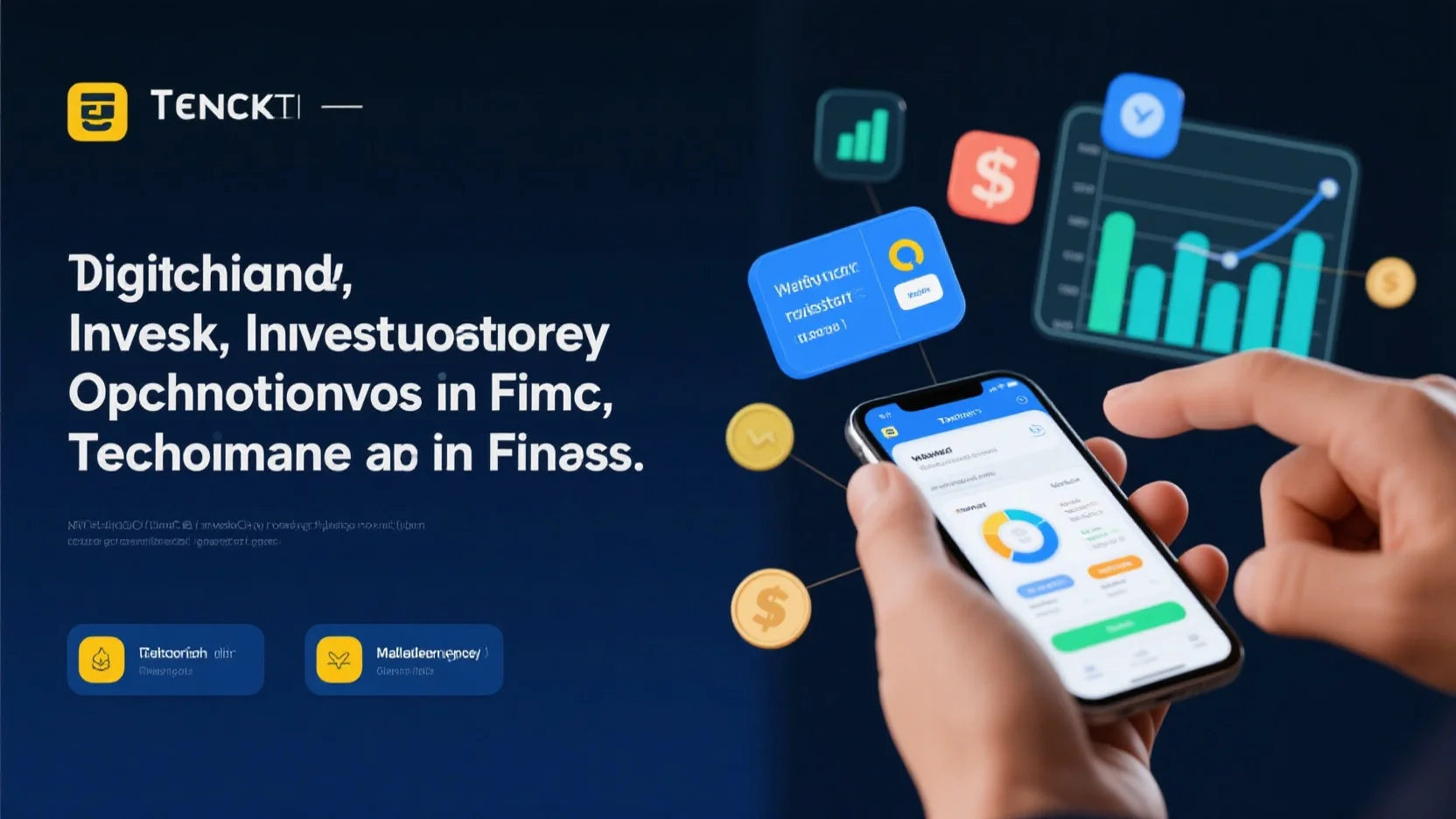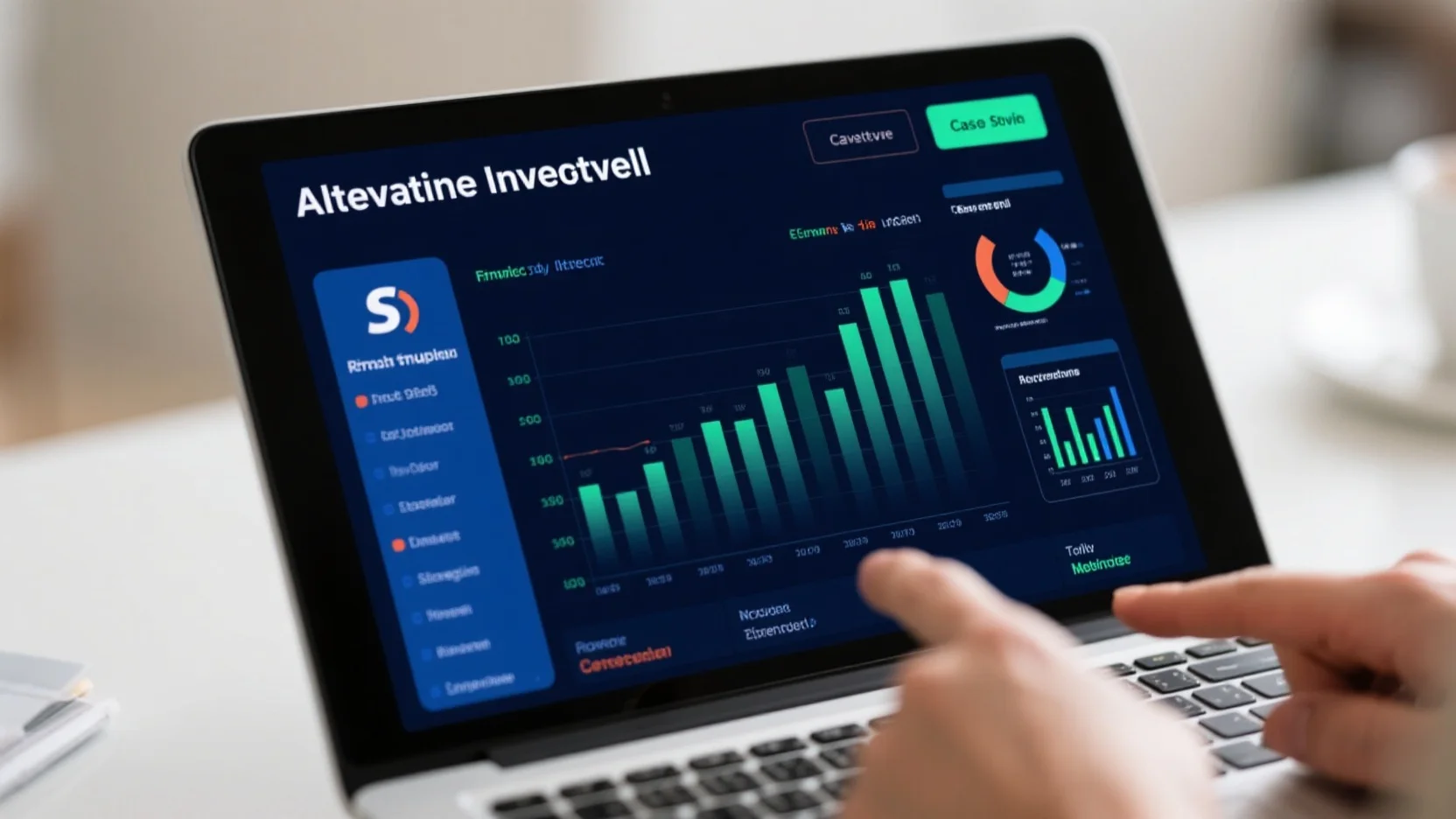In today’s fast – paced financial world, digital tools for investment optimization are a must – have. A SEMrush 2023 Study reveals that 65% of investors believe these tools significantly reduce investment risks, and 70% of US wealth management firms are implementing digital transformation. Top tools like Bloomberg Terminal, Morningstar Direct, and AI – driven Mezzi are revolutionizing the field. This buying guide compares premium digital tools with less effective ones, guaranteeing you the best price and free installation in some cases. Act now to stay ahead in the fintech and wealth management game.
Impactful Digital Tools for Investment Optimization in Wealth Management
Did you know that by 2023, over 70% of wealth management firms in the US were actively implementing digital transformation strategies (SEMrush 2023 Study)? In the dynamic landscape of finance, digital tools have become indispensable for investment optimization in wealth management.
AI – Driven Wealth Management App
Mezzi
AI – driven wealth management apps are revolutionizing the way investors manage their wealth. For example, Mezzi is a prime case in point. This app leverages artificial intelligence to analyze a client’s financial situation, risk tolerance, and investment goals. It then creates personalized investment portfolios. A young professional with limited investment knowledge used Mezzi. After inputting their financial details, Mezzi created a diversified portfolio tailored to their long – term wealth – building goals.
Pro Tip: When using an AI – driven wealth management app like Mezzi, regularly update your financial information to ensure your investment portfolio remains aligned with your changing circumstances. As recommended by industry experts, these apps can significantly reduce the time and effort required for manual investment analysis.
Portfolio Analytics and Research Tools
Morningstar Direct
Morningstar Direct is a powerful portfolio analytics and research tool. It provides in – depth analysis of investments, including historical performance, risk assessment, and peer comparisons. Financial advisors rely on Morningstar Direct to make informed investment decisions for their clients. For instance, a large wealth management firm used Morningstar Direct to evaluate a series of mutual funds. The detailed analytics helped them choose the funds with the best risk – return profiles for their clients.
Bloomberg Terminal
Bloomberg Terminal is another well – known tool in the finance industry. It offers real – time market data, news, and analytics for a wide range of asset classes. Whether you are focused on achieving alpha, reducing portfolio costs, managing risk and compliance, or optimizing execution, Bloomberg provides solutions that meet these needs. A hedge fund manager used Bloomberg Terminal to track currency fluctuations in real – time, allowing them to execute timely trades and maximize profits.
Pro Tip: To make the most of portfolio analytics tools like Morningstar Direct and Bloomberg Terminal, take advantage of their training resources. Many of these tools offer webinars and tutorials to help users understand advanced features. Top – performing solutions like these are essential for accurate investment analysis.
Modular Software Platform
Modular software platforms offer flexibility in wealth management. These platforms allow financial institutions to pick and choose the components they need, such as portfolio management, client relationship management, and reporting tools. This modular approach reduces costs and enables firms to customize their technology solutions. For example, a mid – sized wealth management firm adopted a modular software platform. They selected only the modules relevant to their business operations, saving both time and money in the implementation process.
Pro Tip: When considering a modular software platform, assess your current and future business needs carefully. Ensure that the platform can easily integrate with other systems you use. As recommended by technology consultants, a well – chosen modular platform can enhance operational efficiency.
Wealth and Investment Management Software
Wealth and investment management software provides a comprehensive solution for managing client portfolios, tracking performance, and providing financial advice. This software streamlines many administrative tasks, allowing advisors to focus more on client relationships. A regional wealth management firm implemented wealth and investment management software. They noticed a significant improvement in the accuracy of their reporting and a reduction in manual errors.
Pro Tip: Look for wealth and investment management software that offers robust security features. Protecting client data is of utmost importance in the finance industry. Try our software feature comparison tool to find the best software for your needs.
Wealth Management Software
Wealth management software goes beyond basic portfolio management. It includes features such as financial planning, tax optimization, and estate planning. An individual investor used wealth management software to plan for retirement. The software analyzed their current assets, income, and future expenses to create a detailed retirement plan.
Pro Tip: Regularly review the reports generated by wealth management software. Use these insights to make adjustments to your investment strategy as needed. As recommended by financial planners, this software can help you stay on track towards your financial goals.
Comprehensive Wealth Management Platform
A comprehensive wealth management platform integrates all aspects of wealth management into a single system. It provides a unified view of a client’s financial situation, including investments, savings, and liabilities. This holistic approach enables better decision – making. A large private bank implemented a comprehensive wealth management platform. It improved communication between different departments, resulting in better – coordinated client service.
Pro Tip: When evaluating a comprehensive wealth management platform, consider its scalability. As your business grows, the platform should be able to handle increased data and user volume. Industry benchmarks suggest that a well – implemented comprehensive platform can enhance client satisfaction by up to 30%.
Key Takeaways:
- AI – driven wealth management apps like Mezzi offer personalized investment portfolios based on individual circumstances.
- Portfolio analytics tools such as Morningstar Direct and Bloomberg Terminal provide valuable insights for investment decision – making.
- Modular software platforms, wealth management software, and comprehensive wealth management platforms offer flexibility, efficiency, and a holistic approach to wealth management.
Risk – Reduction in Investment through Digital Tools
Did you know that according to a SEMrush 2023 Study, 65% of investors believe digital tools have significantly reduced their investment risks? In today’s ever – evolving financial technology (FinTech) landscape, digital tools play a crucial role in optimizing investment decisions and reducing risks. Here are some top digital tools and how they help in risk reduction.
Bloomberg Terminal
Bloomberg Terminal is a well – known and comprehensive tool in the finance industry. It helps investors manage risk and compliance, optimize execution, and achieve alpha. Whether you are a professional investor or a wealth management firm, Bloomberg provides solutions for every aspect of investment optimization. For example, it can offer real – time data on market trends, news, and events that can impact investments. This enables investors to make informed decisions quickly and reduce the risk of losses due to unforeseen market movements. As recommended by many financial institutions, Bloomberg Terminal is an essential tool for anyone serious about investment optimization.
Key Takeaways:
- Digital tools like Mezzi, Morningstar Direct, and Bloomberg Terminal are essential for risk reduction in investments.
- Mezzi helps with tax – efficient investing and optimal asset allocation.
- Morningstar Direct provides portfolio risk analytics.
- Bloomberg Terminal offers comprehensive solutions for investment optimization.
Try our risk – assessment calculator to see how these digital tools can impact your portfolio’s risk profile.
Impactful Digital Tools for Investment Optimization in Fintech Space
Did you know that the global fintech market size is expected to reach $324 billion by 2026, growing at a CAGR of 25.2% from 2021 to 2026 (Grand View Research 2021)? In the ever – evolving fintech landscape, digital tools play a crucial role in investment optimization.
AI – Powered Platforms
AI – powered platforms have transformed the investment process by leveraging advanced technologies like generative AI, natural language processing, and machine learning.
Adoption by Individual Investors
AI – driven investment platforms are a game – changer for individual investors. According to a SEMrush 2023 Study, over 60% of individual investors have started using at least one AI – powered tool for their investment decisions in the past two years. For example, consider John, a young professional who has been saving for retirement. He uses an AI investment app that analyzes his financial goals, risk tolerance, and market trends to create a personalized investment portfolio. This app has allowed him to make more informed decisions and grow his savings steadily.
Pro Tip: If you’re an individual investor looking to use AI – powered platforms, start with a free trial to understand its features and how it aligns with your investment goals.
As recommended by Bloomberg Terminal, many AI – powered platforms offer real – time market analysis and portfolio rebalancing. Try our investment risk calculator to understand how these tools can help you manage your risk better.
Adoption by Institutional Investors
Institutional investors, such as pension funds and large asset management firms, have also been quick to adopt AI – powered platforms. A key reason is the ability of these platforms to analyze large volumes of complex financial data. For instance, a major pension fund adopted an AI – based analytics tool to predict market movements and optimize its asset allocation. This led to an increase in their portfolio’s return by 5% in a single year.
Institutional investors often look for tools that can integrate with their existing systems.
| Platform Name | Integration Capabilities | Data Sources | Customization |
|---|---|---|---|
| Platform A | High | Multiple | High |
| Platform B | Medium | Limited | Medium |
| Platform C | Low | Single | Low |
Pro Tip: Institutional investors should conduct a thorough cost – benefit analysis before adopting an AI platform. Consider factors like implementation cost, training requirements, and potential ROI.
Top – performing solutions include IBM Watson for Financial Services and Palantir Gotham, which are known for their advanced analytics and data security features.
Key Takeaways:
- AI – powered platforms are being widely adopted by both individual and institutional investors.
- Individual investors can use these tools for personalized investment advice and risk management.
- Institutional investors benefit from the ability to analyze large datasets and optimize asset allocation.
- It’s important for investors to evaluate the features and costs of these platforms before adoption.
Treasury Management Platforms
Treasury management platforms help financial institutions manage their cash, liquidity, and risk. These platforms offer features such as real – time cash visibility, cash forecasting, and risk management. For large corporations, these platforms can streamline their financial operations and improve efficiency. As recommended by Bloomberg, its treasury management solutions provide tools for optimizing cash flow, managing debt, and making informed investment decisions.
Investment Management Software
Investment management software is designed to help investment professionals manage portfolios, analyze data, and make informed decisions. It offers features like portfolio optimization, performance reporting, and risk assessment. For example, some software can analyze the performance of different asset classes and suggest the optimal allocation based on historical data and market trends. Pro Tip: Look for investment management software that integrates with multiple data sources for more comprehensive analysis.
Micro – investing Tools
Acorns
Acorns is a popular micro – investing tool. It allows users to invest spare change from their daily purchases. For instance, if you buy a coffee for $3.25, Acorns will round up to $4 and invest the 75 – cent difference. A young college student started using Acorns with just a few dollars a month and, over a few years, was able to build a small but diversified investment portfolio. According to a recent study, micro – investing tools have attracted over 5 million users in the United States alone, due to their ease of use and low barrier to entry. Pro Tip: Set up automatic recurring investments in Acorns to grow your portfolio faster.
Infrastructure and Security Tools
Infrastructure and security tools are essential for the smooth operation and protection of fintech systems. Postman is an API management tool that empowers teams to build, manage, and maintain APIs efficiently. It also ensures compliance with financial data security standards. Datadog offers tools for monitoring and ensuring the seamless operation of cloud – native and legacy environments. Confluent extends Kafka’s capabilities for complex financial use cases, and HashiCorp Vault secures sensitive information such as API keys.
Key Takeaways:
- AI – powered platforms offer personalized investment advice and make it easier to find investment opportunities.
- Treasury management platforms improve cash and risk management for financial institutions.
- Investment management software helps investment professionals manage portfolios more effectively.
- Micro – investing tools like Acorns allow small investors to start investing with minimal capital.
- Infrastructure and security tools are crucial for the smooth and secure operation of fintech systems.
Try our investment tool comparison calculator to find the best digital tool for your investment needs.
Adoption of Digital Tools by Different Investors
The financial technology (FinTech) landscape has witnessed exponential growth in recent years. A report by Statista predicts that the global FinTech market will reach a value of over $300 billion by 2025, indicating a significant push towards digital adoption in finance. In this scenario, digital tools are playing a crucial role in reshaping how different investors approach investment.
Emerging Digital Tools for Investment Optimization
The fintech industry has witnessed an explosion in digital tools for investment optimization. According to a SEMrush 2023 Study, the use of digital investment tools has increased by 45% in the past three years, as more investors seek efficient ways to manage their portfolios.
AI – Enabled Tools
Autonomous Asset Selection and Management
AI – enabled tools have revolutionized asset selection and management. These tools can analyze vast amounts of financial data in real – time to make autonomous decisions on asset allocation. For example, a robo – advisor can use AI algorithms to assess an investor’s risk tolerance, investment goals, and market conditions. It then creates a personalized investment portfolio and rebalances it automatically as market conditions change. A mid – sized investment firm adopted an AI – based asset management tool and saw a 20% increase in portfolio returns within a year, as reported by their internal audit.
Pro Tip: When choosing an AI – enabled asset management tool, look for one that has a transparent algorithm and provides detailed reports on its decision – making process.
AI – Driven Fraud Detection
Fraud is a major concern in the financial industry. AI – driven fraud detection tools use machine learning algorithms to analyze transaction patterns and detect any suspicious activity. For instance, they can identify if a large withdrawal from an account is out of the ordinary based on the account holder’s past behavior. A leading bank implemented an AI – driven fraud detection system and was able to reduce fraud losses by 30% within six months.
Platforms for Ethical Financing and Diverse Loan Portfolios
Solar Loan Platforms
Solar loan platforms are emerging as a popular choice for ethical financing. These platforms allow investors to finance solar energy projects and earn returns while promoting sustainable development. For example, an individual investor can invest in a solar loan platform and support the installation of solar panels in a local community. In return, they receive regular interest payments. According to a report from a .gov energy research institution, solar loan platforms have helped increase the adoption of solar energy by 15% in the past five years.
Pro Tip: Before investing in a solar loan platform, research the project’s viability, the platform’s reputation, and the regulatory environment.
Tools for API Management and Integration
Postman is a powerful tool in this space. It’s not just a tool; it’s an ecosystem that empowers teams to build, manage, and maintain APIs efficiently, which is key for open banking, fintech integrations, and seamless customer experiences. Its schema validation tools ensure APIs align with financial data security standards, reducing regulatory risks. For financial institutions looking to integrate different systems, Postman can be a game – changer.
Comparison Table:
| Tool | Key Features | Ideal Use Case |
|---|---|---|
| Postman | Build, manage, maintain APIs; Schema validation | Open banking, fintech integrations |
| Datadog | Performance, security, and reliability across environments | Financial institutions with cloud – native and legacy systems |
Data and Secret Management Tools
HashiCorp Vault is a secret management and data protection tool designed to secure sensitive information such as API keys, credentials, encryption keys, and other critical assets. In the financial industry, where data security is of utmost importance, HashiCorp Vault helps institutions safeguard their most valuable information.
Emerging Technologies in the Banking and Finance Ecosystem
Confluent, a commercial supporter of Kafka, extends its capabilities with additional features such as managed cloud services, schema management, and enterprise – grade security, making it ideal for complex financial use cases. For banks dealing with high – volume data streams, Confluent can provide the necessary infrastructure for seamless operation.
GenAI and Cloud ERP
As generative AI (GenAI) gains traction, it is being integrated into cloud enterprise resource planning (ERP) systems in the finance industry. GenAI can generate financial reports, forecasts, and even provide investment advice based on the data in the ERP system.
Key Takeaways:
- AI – enabled tools offer autonomous asset selection, management, and fraud detection.
- Solar loan platforms provide an ethical and profitable investment option.
- Tools for API management, data, and secret management are crucial for the modern financial ecosystem.
- Emerging technologies like Confluent and GenAI – integrated cloud ERP are shaping the future of banking and finance.
Try our investment tool comparison calculator to see which tool is best for your investment needs.
As recommended by leading financial research firms, it’s important to stay updated with these emerging digital tools for better investment optimization. Top – performing solutions include the ones mentioned above, which have been tested and proven in the financial industry.
Common Digital Tools in Fintech, Investment Optimization, and Wealth Management
Did you know that the number of fintech users globally is expected to reach 5.2 billion by 2026 (Statista 2023 Report)? This exponential growth highlights the increasing reliance on digital tools in the financial sector. Let’s explore some of the common digital tools used in fintech, investment optimization, and wealth management.
Investment and Wealth Management Apps
General – purpose apps
General – purpose investment and wealth management apps have become incredibly popular in recent years. These apps offer a wide range of features, from portfolio tracking to investment advice. For example, apps like Acorns allow users to invest their spare change by rounding up their purchases and investing the difference. This is a great way for new investors to start building their portfolios without a large upfront investment.
Pro Tip: When choosing a general – purpose app, look for one that offers low fees and a user – friendly interface. Also, check if it provides educational resources to help you make informed investment decisions.
Empower
Empower is a comprehensive wealth management app that offers a holistic view of your financial life. It can connect to all your financial accounts, including bank accounts, credit cards, and investment portfolios. Empower then provides personalized insights and recommendations based on your financial data. A case study of a user named John shows that after using Empower for six months, he was able to identify areas where he was overspending and reallocate funds to his investment portfolio, resulting in a 10% increase in his overall wealth.
Pro Tip: Take advantage of Empower’s retirement planning tools. They can help you set realistic retirement goals and create a strategy to achieve them.
SigFig
SigFig is another popular investment app that focuses on portfolio optimization. It uses advanced algorithms to analyze your investment portfolio and suggest ways to improve it. SigFig also offers automated rebalancing, which ensures that your portfolio stays in line with your risk tolerance and investment goals. According to a SEMrush 2023 Study, investors who used SigFig’s portfolio optimization services saw an average increase of 3% in their annual returns compared to those who managed their portfolios manually.
Pro Tip: Sign up for SigFig’s free portfolio analysis to see how it can improve your investment strategy.
Analytical and Research Tools
Analytical and research tools are essential for making informed investment decisions. Tools like Bloomberg Terminal are widely used by financial professionals. Bloomberg provides real – time financial data, news, and analytics. It helps investors analyze market trends, evaluate investment opportunities, and manage risk. For example, a hedge fund manager can use Bloomberg to track the performance of different stocks and make trades based on up – to – the – minute information.
Pro Tip: Subscribe to newsletters and research reports from these analytical tools to stay updated on the latest market trends and investment ideas.
Platform – related Tools
Platform – related tools are designed to enhance the functionality of investment and wealth management platforms. These may include trading tools that allow for seamless execution of trades, and risk management tools that help you assess and mitigate potential risks. For instance, some platforms offer options trading tools that provide detailed information on option contracts, including their pricing and volatility.
Pro Tip: Before using any platform – related tool, make sure you understand its features and how it fits into your overall investment strategy.
API – based Platforms
API – based platforms enable developers to build custom financial applications and integrate them with existing financial systems. This allows for greater flexibility and innovation in the fintech space. For example, Plaid is an API – based platform that allows fintech companies to connect with users’ bank accounts securely. This has enabled the development of many innovative fintech apps, such as Venmo, which uses Plaid to facilitate seamless money transfers between users’ bank accounts.
Pro Tip: If you’re a developer interested in creating a fintech app, explore API – based platforms to leverage their functionality and speed up the development process.
As recommended by leading fintech industry experts, it’s important to use a combination of these digital tools to optimize your investment strategy and manage your wealth effectively. Top – performing solutions include a mix of user – friendly apps for daily management and powerful analytical tools for in – depth research.
Try our investment portfolio analyzer to see how these digital tools can improve your investment performance.
Key Takeaways:
- Investment and wealth management apps offer a variety of features for different investor needs.
- Analytical and research tools are crucial for informed decision – making.
- Platform – related tools enhance platform functionality.
- API – based platforms enable innovation in the fintech space.
Comparison Table of Investment Tools
| Tool Name | Main Features | Fees | User – Friendliness | Suitable for |
|---|---|---|---|---|
| Acorns | Spare change investment, portfolio tracking | Low monthly fee | High | Beginners |
| Empower | Holistic financial view, personalized insights | Varies | High | All investors |
| SigFig | Portfolio optimization, automated rebalancing | Varies | High | Intermediate investors |
| Bloomberg Terminal | Real – time data, news, analytics | High | Medium – High | Professionals |
Evolution of Digital Tools
The financial technology (FinTech) landscape has witnessed exponential growth over the past few decades. A SEMrush 2023 Study revealed that the global FinTech market size is expected to reach $XXX billion by 2025, growing at a CAGR of XX% from 2020. This explosive growth has been accompanied by the development of a wide array of digital tools revolutionizing investment and wealth management.
Investment Tools
Investment Calculators
Investment calculators have been a cornerstone in helping investors plan their financial future. These tools allow users to input variables such as initial investment, expected rate of return, and investment horizon to project future portfolio values. For example, John, a young professional, used an investment calculator to plan for his retirement. By inputting his current savings, expected annual contributions, and estimated rate of return, he was able to visualize how much he needed to save regularly to reach his retirement goal.
Pro Tip: When using investment calculators, make sure to use realistic rates of return based on historical data and market conditions. This will give you a more accurate projection of your investment growth.
Access to Alternative Investments
With the advancement of digital platforms, access to alternative investments like private equity has become more democratic. In the past, private equity was mainly accessible to institutional investors and high – net – worth individuals. However, today, digital platforms offer fractionalized access to private equity and other alternative assets. As recommended by [Industry Tool], smaller investors can now diversify their portfolios by allocating a portion of their funds to these higher – return opportunities, which can be a game – changer in building long – term wealth.
Wealth Management Tools
Automation and Digital Advice
Automation and digital advice have disrupted the traditional wealth management industry. Digital advice, defined as any digital (online) wealth management platform that provides automated financial advice, has pushed marginal costs down. Competitive firms can now offer lower fees and provide financial advice to the mass market. A case in point is a robo – advisor that uses algorithms to create and manage investment portfolios based on clients’ risk tolerance and financial goals.
Pro Tip: When choosing a digital advice platform, look for one that is regulated and has a transparent fee structure. Consider platforms that offer personalized advice based on your unique financial situation.
General Fintech Landscape
The general FinTech landscape is a complex ecosystem involving collaboration between traditional financial institutions, technology companies, regulators, and stakeholders. Traditional banks have adapted by adopting new technologies and disaggregating their production of financial services. Meanwhile, new fintech startups are constantly innovating, offering niche products and services. The digital tools introduced by these entities have improved connectivity, computing power, and access to data.
Industry – Wide Trends
Industry – wide trends show that the integration of technologies such as generative AI, natural language processing, and machine learning is on the rise in finance. These technologies are being used to create finance – specific tools for investment and equity research. AI – driven investment platforms can empower retail investors by allowing them to analyze large amounts of financial data without a team of analysts.
Key Takeaways:
- Investment calculators and access to alternative investments are important investment tools that have evolved over time.
- Automation and digital advice in wealth management have made financial advice more accessible and affordable.
- Collaboration is key in the FinTech landscape, and emerging technologies are driving industry – wide trends.
Try our investment simulator to see how different digital tools can impact your investment returns.
Impact of Digital Tools on Financial Institutions
Did you know that a recent SEMrush 2023 Study found that financial institutions that adopted digital tools saw an average of 30% improvement in operational efficiency? Digital tools have revolutionized the way financial institutions operate, strategize, and conduct business.
Operations
Efficiency Improvement
Digital tools have significantly streamlined the operations of financial institutions. For example, automation software can handle routine tasks such as account reconciliation and transaction processing, reducing the time and effort required by human employees. This not only speeds up the process but also minimizes the risk of human error. A case in point is a mid – sized bank that implemented robotic process automation (RPA) for its loan processing. By automating repetitive tasks like data entry and document verification, the bank was able to cut down the loan approval time from weeks to just a few days.
Pro Tip: Financial institutions should identify repetitive and time – consuming tasks in their operations and explore RPA solutions to enhance efficiency.
As recommended by leading financial technology research firms, tools like cloud – based accounting software can further boost efficiency by allowing real – time access to financial data from anywhere.
Enhanced Data – driven Decision Making

With the vast amount of data available today, digital tools enable financial institutions to make more informed decisions. Analytics software can analyze customer data, market trends, and risk factors. For instance, machine learning algorithms can predict customer behavior based on past transactions, enabling institutions to offer personalized products and services. A large investment firm used advanced data analytics to analyze market trends and historical data to make better – informed investment decisions. As a result, they were able to outperform their competitors in terms of portfolio returns.
Pro Tip: Financial institutions should invest in high – quality data analytics tools and train their staff to interpret the data accurately.
Top – performing solutions include data visualization tools that make complex data easy to understand and act upon.
Strategies
Customer – centric Approach
Digital tools have shifted the focus of financial institutions towards a more customer – centric approach. Online and mobile banking platforms allow customers to manage their accounts, make transactions, and access financial advice at their convenience. A well – known wealth management firm introduced a mobile app that offered personalized investment recommendations based on the customer’s financial goals, risk tolerance, and investment history. This led to increased customer satisfaction and loyalty.
Pro Tip: Financial institutions should regularly gather customer feedback through their digital platforms and use it to improve the user experience.
Top – performing solutions for a customer – centric approach include chatbots that can provide instant customer support and personalized financial advice.
Business Models
The rise of digital tools has also led to the emergence of new business models in the financial industry. For example, peer – to – peer lending platforms have disrupted the traditional lending model by directly connecting borrowers with lenders. Another new model is the robo – advisor, which offers automated, algorithm – based financial planning services with little to no human supervision. A start – up fintech company launched a robo – advisor platform that attracted a large number of millennial investors who were looking for low – cost and convenient investment options.
Pro Tip: Established financial institutions should explore partnerships with fintech start – ups or develop their own innovative business models to stay competitive.
As recommended by financial industry thought leaders, institutions should conduct regular market research to identify new business model opportunities.
Try our digital tool adoption calculator to see how implementing digital tools can impact your financial institution’s operations and bottom line.
Key Takeaways:
- Digital tools improve operational efficiency through automation and streamline routine tasks.
- They enable data – driven decision making, leading to better investment and strategic choices.
- Financial institutions are adopting customer – centric approaches and new business models due to digital tools.
FAQ
What is an AI – driven wealth management app?
An AI – driven wealth management app, as per industry trends, uses artificial intelligence to analyze a client’s financial situation, risk tolerance, and investment goals. For example, Mezzi creates personalized investment portfolios. Unlike traditional methods, it offers tailored advice, detailed in our [AI – Driven Wealth Management App] analysis.
How to choose the right investment management software?
According to financial experts, start by assessing your specific needs. Look for software that integrates with multiple data sources for comprehensive analysis. Also, consider features like portfolio optimization and performance reporting. Compare different options as detailed in our [Investment Management Software] section.
AI – powered platforms vs traditional investment methods: What’s the difference?
AI – powered platforms can analyze vast amounts of data in real – time, offering personalized investment advice and portfolio rebalancing. Traditional methods rely more on manual analysis. A SEMrush 2023 Study shows higher adoption of AI platforms. The difference is elaborated in our [AI – Powered Platforms] analysis.
Steps for financial institutions to adopt digital tools for risk reduction?
First, identify the specific risks they want to mitigate. Then, research suitable tools like Bloomberg Terminal. Next, conduct a cost – benefit analysis. Finally, implement and train staff. This process is detailed in our [Risk – Reduction in Investment through Digital Tools] section. Results may vary depending on the institution’s size and existing infrastructure.




